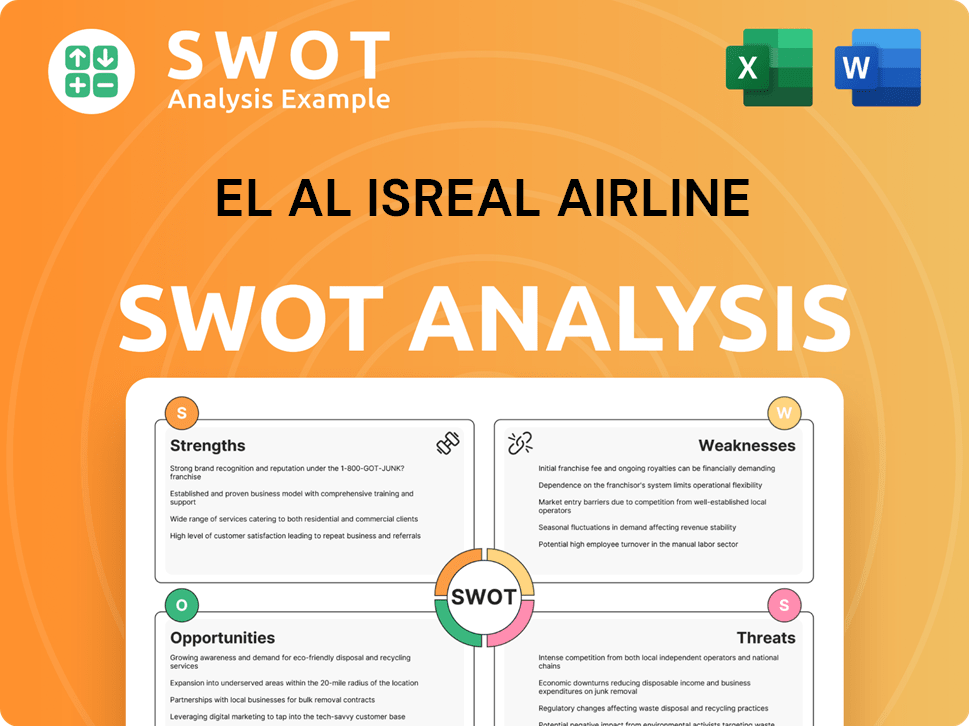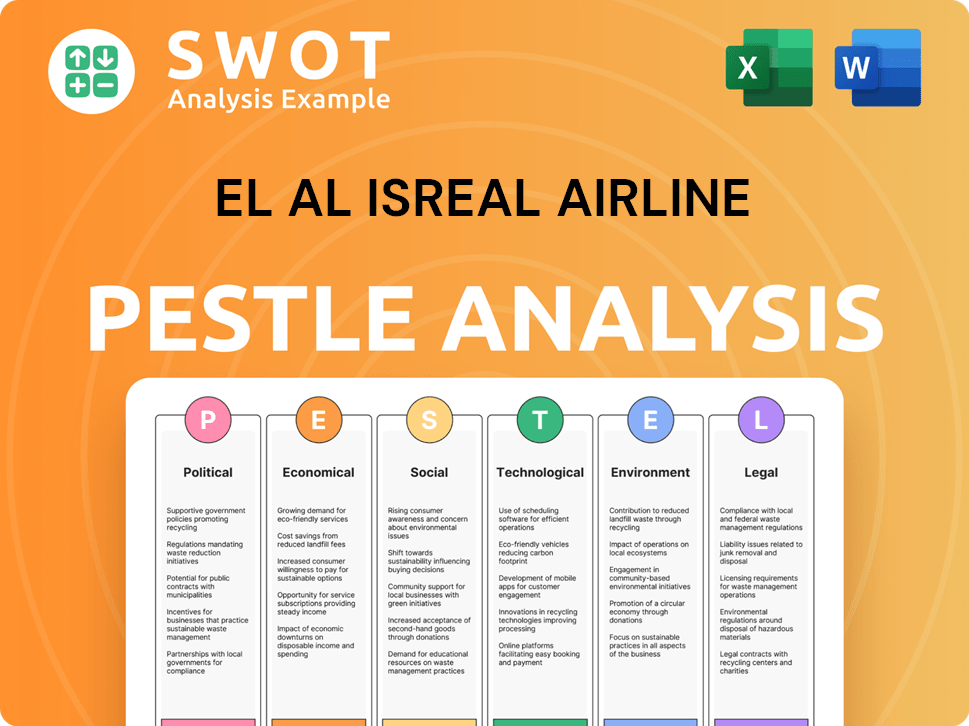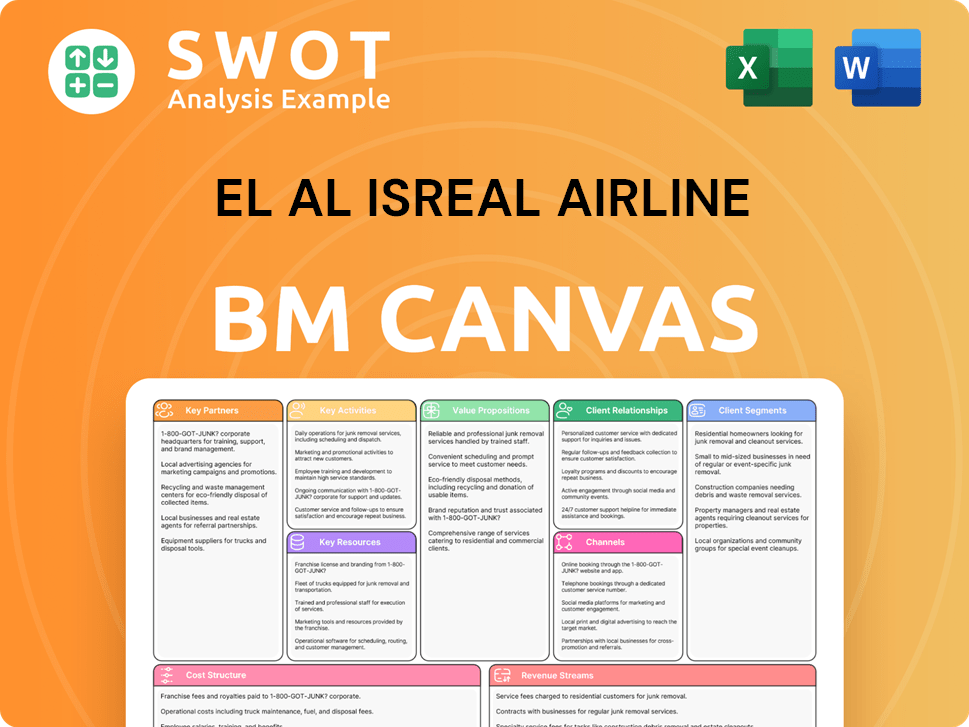EL AL Isreal Airline Bundle
How has EL AL Israel Airlines weathered the storms of history?
From its symbolic inception transporting Israel's first president to its current status as a global carrier, the story of EL AL Israel Airlines is one of resilience and strategic adaptation. This EL AL Isreal Airline SWOT Analysis can provide insights into the company's strengths and weaknesses. Explore the fascinating history of this iconic Israeli airline, from its humble beginnings to its present-day operations, and discover the key moments that shaped its journey.

The History of EL AL is intertwined with the very fabric of Israeli aviation. With a rich history, the Israeli airline has faced numerous challenges and celebrated significant milestones. Understanding the EL AL's founding date and the evolution of its EL AL fleet is crucial to grasping its impact on Israeli tourism and its role in connecting Israel with the world, including its diverse EL AL destinations.
What is the EL AL Isreal Airline Founding Story?
The founding of EL AL Israel Airlines is a story deeply rooted in the establishment of the State of Israel. The airline's creation was driven by the urgent need for an independent air bridge to connect the newly formed nation with the rest of the world. This necessity, coupled with a desire to facilitate immigration, shaped the early years of the Israeli airline.
Officially incorporated on November 15, 1948, EL AL's origins are tied to a specific event in September 1948. The Israeli government needed to transport its newly designated President, Chaim Weizmann, back from Switzerland. The airline's name, 'El Al,' meaning 'to the skies,' from the biblical book of Hosea, was chosen to reflect the nationalistic aspirations of the venture. The company's initial capitalization was 1.1 million Lira, with the Israeli government as the controlling shareholder.
The early focus of EL AL was on providing a reliable civil air link, especially for transporting Jewish immigrants. The first flight, a special mission to bring President Weizmann home, set the stage. This mission was undertaken by a hastily modified C-54 plane, which was painted with the 'El Al' name and the Israeli flag. This makeshift aircraft completed a 10-hour non-stop flight from Geneva to Ekron Air Base, which later became Ben Gurion Airport.
The establishment of EL AL was closely linked to the creation of Israel in 1948, driven by the need for air transport.
- The initial mission was to bring the President of Israel home from Switzerland.
- The company was incorporated on November 15, 1948.
- The name 'El Al' means 'to the skies'.
- The initial capital was 1.1 million Lira.
EL AL Isreal Airline SWOT Analysis
- Complete SWOT Breakdown
- Fully Customizable
- Editable in Excel & Word
- Professional Formatting
- Investor-Ready Format

What Drove the Early Growth of EL AL Isreal Airline?
The early years of EL AL Israel Airlines were marked by rapid growth and the establishment of its commercial operations. The airline quickly transitioned from special flights to scheduled services, connecting Tel Aviv with major European and North American cities. This period saw the expansion of the EL AL fleet and the development of its role in both commercial aviation and humanitarian efforts.
EL AL's first scheduled flight took off on July 31, 1949, from Tel Aviv to Rome and Paris, marking the beginning of regular commercial flights. The initial fleet included two used DC-4s acquired from American Airlines, named 'Rechovoth' and 'Herzl'. Many of the original pilots were volunteers from the U.S., England, and South Africa who had supported Israel during its War of Independence.
A significant aspect of EL AL's early operations involved large-scale immigrant airlifts. 'Operation Magic Carpet' (January 1949) transported approximately 47,000 Yemenite and 3,000 Habbanim Jews to Israel. 'Operation Ali Baba' (May 1950 – December 1951) airlifted 113,000 Iraqi immigrants. These missions established EL AL's operational capabilities and built its reputation.
EL AL launched its first trans-Atlantic charter flight from Tel Aviv to New York on June 18, 1950. Regular service between Tel Aviv and New York began in April 1951. The introduction of the Boeing 707 in the early 1960s brought EL AL into the jet age, enabling direct Tel Aviv to New York flights. Since then, EL AL has exclusively ordered Boeing aircraft. You can also read about the Marketing Strategy of EL AL Isreal Airline.
By the 1980s, EL AL had expanded its routes to many major cities in Europe, Asia, Africa, and the Americas. The airline also expanded its business model by establishing subsidiaries like Teshet, which operates travel agencies, catering facilities, and hotels. EL AL's growth was shaped by its dual role as a commercial entity and a national asset.
EL AL Isreal Airline PESTLE Analysis
- Covers All 6 PESTLE Categories
- No Research Needed – Save Hours of Work
- Built by Experts, Trusted by Consultants
- Instant Download, Ready to Use
- 100% Editable, Fully Customizable

What are the key Milestones in EL AL Isreal Airline history?
The History of EL AL Israel Airlines is marked by significant milestones, reflecting its growth and adaptation within the Israeli aviation industry. From its founding to its current operations, EL AL has consistently evolved to meet the challenges and opportunities of the global aviation market.
| Year | Milestone |
|---|---|
| 1948 | Founded as the national airline of Israel, marking the beginning of Israeli aviation. |
| 1955 | Became one of only two operators of the Bristol Britannia turboprop airliner, enabling non-stop service between London and New York. |
| Early 1960s | Introduced the Boeing 707, entering the jet age and establishing direct long-haul routes. |
| 2005 | Privatization of the airline. |
| July 2020 | Secured a bailout deal with the Israeli government in response to the COVID-19 pandemic. |
| September 2020 | Kanfei Nesharim, owned by Eli Rozenberg, acquired a controlling 44.98% stake. |
| May 2025 | Delivery of the 17th Boeing 787 Dreamliner. |
EL AL has been at the forefront of several innovations that have shaped its identity and operational capabilities. A key focus has been on security, with the airline implementing stringent measures.
EL AL is the only commercial airline to equip its planes with missile defense systems. It is widely regarded as one of the world's most secure airlines due to its stringent security procedures.
EL AL was one of the first airlines globally to offer kosher meals. This reflects its commitment to Israeli identity and passenger needs.
The introduction of the Boeing 707 in the early 1960s was a major technological leap, bringing the airline into the jet age and establishing direct long-haul routes. Further fleet modernization efforts have seen the introduction of Boeing 787 Dreamliners.
Throughout its history, EL AL has faced numerous challenges, from market downturns to geopolitical issues. The COVID-19 pandemic significantly impacted the airline, leading to financial losses and operational disruptions.
EL AL has faced challenges from market downturns and competitive pressures. The airline's market share at Ben Gurion Airport narrowed to 44% in Q1 2025 from 62% in Q1 2024, indicating a return to a more competitive landscape.
Regional conflicts have presented both challenges and unique opportunities. During times when foreign airlines suspended services to Tel Aviv, EL AL maintained an 'air bridge' between Israel and the world.
The COVID-19 pandemic forced EL AL to cancel flights and suspend operations, leading to significant losses in 2020 and 2021. In response, the company secured a bailout deal with the Israeli government in July 2020, involving government loans and a share sale.
During periods of high demand, EL AL faced accusations of price gouging. Despite these challenges, EL AL's Q1 2025 net profit increased by 19% to $96 million.
EL AL Isreal Airline Business Model Canvas
- Complete 9-Block Business Model Canvas
- Effortlessly Communicate Your Business Strategy
- Investor-Ready BMC Format
- 100% Editable and Customizable
- Clear and Structured Layout

What is the Timeline of Key Events for EL AL Isreal Airline?
The History of EL AL Israel Airlines is marked by significant milestones, from its inception to its current status as a leading Israeli airline. Founded in November 1948, the company played a crucial role in the early years of Israel, including airlifting thousands of Jews to the newly formed state. Over the decades, it has evolved, embracing technological advancements and expanding its reach across the globe, while also adapting to various economic and geopolitical challenges. The airline's journey reflects its commitment to connecting Israel with the world.
| Year | Key Event |
|---|---|
| September 1948 | A C-54 aircraft, named 'El Al,' transported Israel's first president. |
| November 15, 1948 | El Al Israel Airlines Ltd. was officially incorporated as Israel's national airline. |
| January 1949 | 'Operation Magic Carpet' began, airlifting thousands of Yemenite Jews to Israel. |
| July 31, 1949 | El Al operated its first scheduled commercial flight from Tel Aviv to Rome and Paris. |
| June 18, 1950 | First trans-Atlantic charter flight from Tel Aviv to New York. |
| April 1951 | Regular scheduled flights from Tel Aviv to New York commenced. |
| 1955 | El Al became one of two operators of the Bristol Britannia turboprop, enabling its first non-stop London-New York service. |
| Early 1960s | Introduction of the Boeing 707, bringing El Al into the jet age and enabling direct Tel Aviv-New York flights. |
| 1990-1991 | Participation in 'Operation Exodus' and 'Operation Solomon,' airlifting Soviet, Eastern European, and Ethiopian Jews. |
| 2005 | El Al was privatized, with the government selling its stake. |
| July 2020 | El Al secured a bailout deal with the Israeli government due to COVID-19 losses. |
| September 2020 | Kanfei Nesharim, owned by Eli Rozenberg, acquired a controlling stake in El Al. |
| May 2022 | Dina Ben Tal Ganancia was appointed as the first female CEO of El Al. |
| 2024 | El Al reported a record net profit of $545 million and revenues of $3.4 billion. |
| Q1 2025 | El Al reported $774 million in revenue and $96 million in net profit. |
| May 2025 | El Al takes delivery of its 17th Boeing 787 Dreamliner. |
By 2030, the company aims to increase its passenger fleet to 61 aircraft. This includes the introduction of more Boeing 787 Dreamliners, with a total of 22 expected by 2029-2030. A widebody freighter is also being considered for addition by 2028.
The airline projects carrying 7.6 million travelers by 2030, a 40% increase from 2023. Revenue targets aim to reach $4 billion by 2030. Maintaining high occupancy rates and managing costs are crucial for profitability.
Key strategies include optimizing the route network and growing digital channels, aiming for half of all sales to be digital by 2030. The company is also focused on developing tourism activities beyond its core business.
The return of foreign airlines to Ben Gurion Airport is impacting EL AL's market share, which decreased to 44% in Q1 2025. Ongoing regional security concerns may continue to limit foreign airline operations. The airline is adapting its strategic plan to evolving geopolitical and economic realities.
EL AL Isreal Airline Porter's Five Forces Analysis
- Covers All 5 Competitive Forces in Detail
- Structured for Consultants, Students, and Founders
- 100% Editable in Microsoft Word & Excel
- Instant Digital Download – Use Immediately
- Compatible with Mac & PC – Fully Unlocked

Related Blogs
- What is Competitive Landscape of EL AL Isreal Airline Company?
- What is Growth Strategy and Future Prospects of EL AL Isreal Airline Company?
- How Does EL AL Isreal Airline Company Work?
- What is Sales and Marketing Strategy of EL AL Isreal Airline Company?
- What is Brief History of EL AL Isreal Airline Company?
- Who Owns EL AL Isreal Airline Company?
- What is Customer Demographics and Target Market of EL AL Isreal Airline Company?
Disclaimer
All information, articles, and product details provided on this website are for general informational and educational purposes only. We do not claim any ownership over, nor do we intend to infringe upon, any trademarks, copyrights, logos, brand names, or other intellectual property mentioned or depicted on this site. Such intellectual property remains the property of its respective owners, and any references here are made solely for identification or informational purposes, without implying any affiliation, endorsement, or partnership.
We make no representations or warranties, express or implied, regarding the accuracy, completeness, or suitability of any content or products presented. Nothing on this website should be construed as legal, tax, investment, financial, medical, or other professional advice. In addition, no part of this site—including articles or product references—constitutes a solicitation, recommendation, endorsement, advertisement, or offer to buy or sell any securities, franchises, or other financial instruments, particularly in jurisdictions where such activity would be unlawful.
All content is of a general nature and may not address the specific circumstances of any individual or entity. It is not a substitute for professional advice or services. Any actions you take based on the information provided here are strictly at your own risk. You accept full responsibility for any decisions or outcomes arising from your use of this website and agree to release us from any liability in connection with your use of, or reliance upon, the content or products found herein.